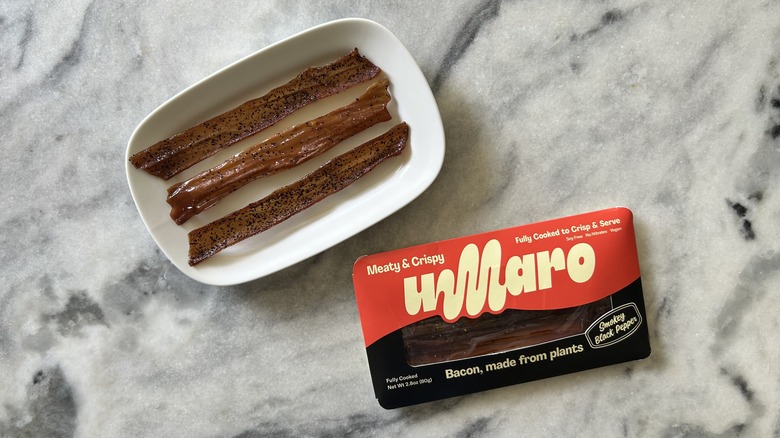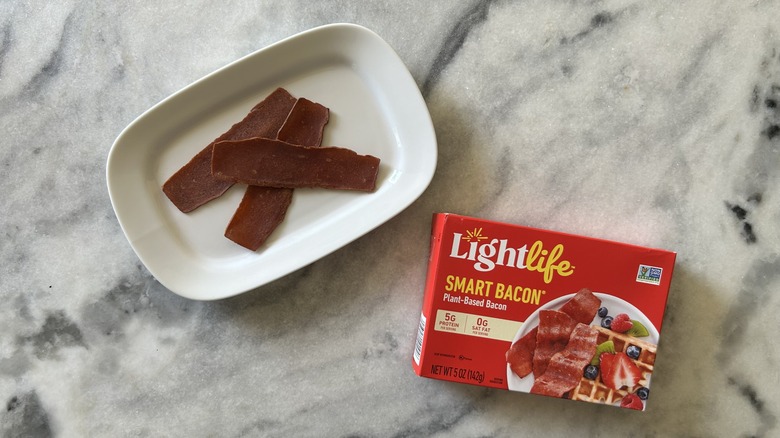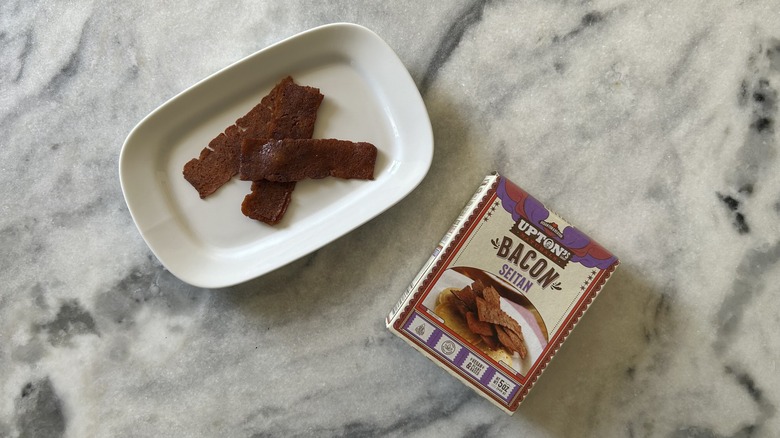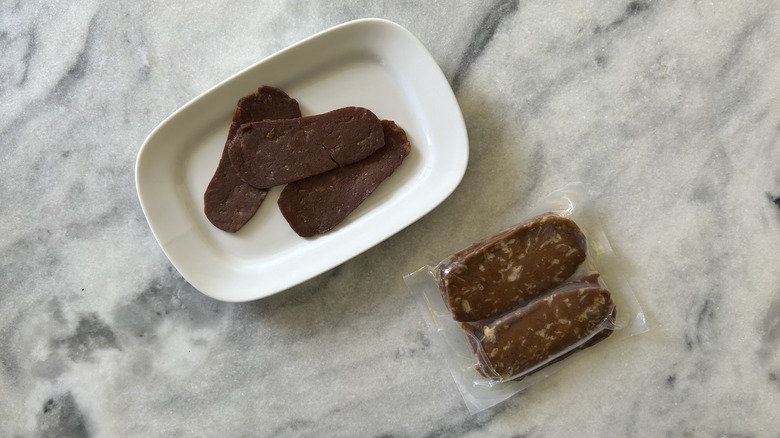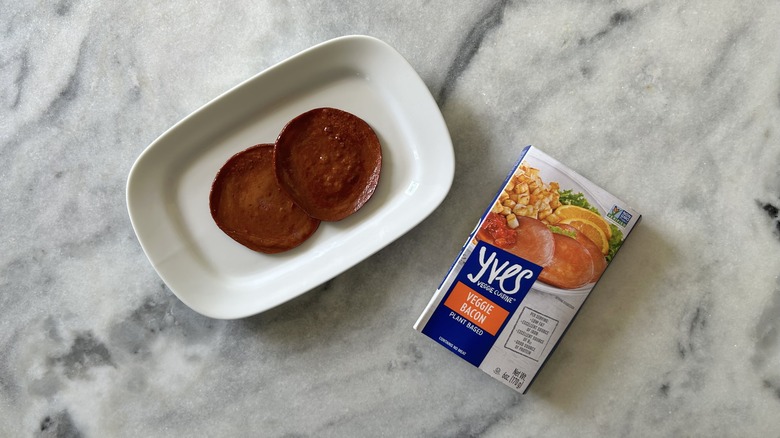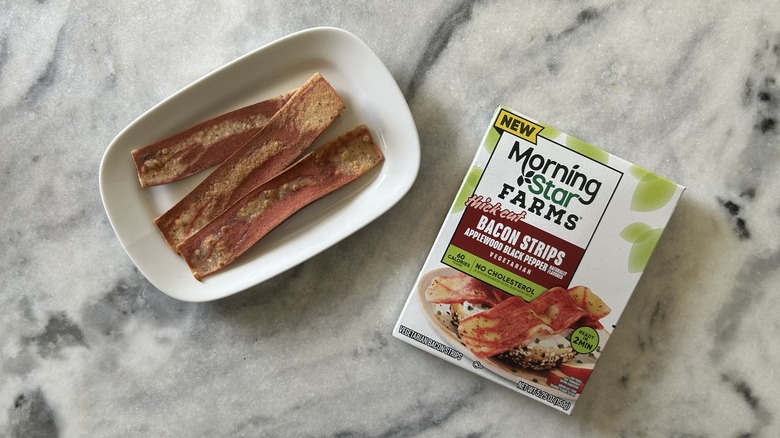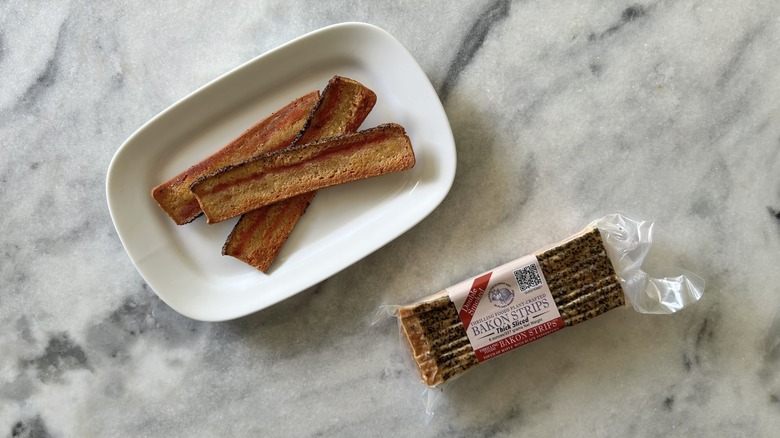7 Plant-Based Bacon Brands, Ranked Worst To Best
From marinating carrot strips to slicing shiitake mushrooms, there are many ways to make meat-free bacon from scratch. But there's a lot to be said about convenience and fortunately, vegetarian and vegan grocery store alternatives have come a long way. These days, the frozen and refrigerated aisles are stacked with plant-based burgers, sausages, deli slices, and more — and in many cases, they're pretty good at mimicking the real thing.
Bacon, however, has been a struggle for brands to replicate. I'm no food scientist but if I had to guess, the textural element is particularly tricky. Traditional pork bacon offers a distinct crispiness that's differentiated by streaks of chewy fat and pockets of liquid grease. Even when expertly seasoned, a roll of rice paper doesn't come close. But some of the products on this list genuinely shocked me. One even left drippings in the pan! I've been on a plant-based diet for more than a decade and have never seen anything like it.
While flavor and texture were key factors of this first-hand review, I also took aspects like nutrition, value, and accessibility into account. Now, let's get to the meat of it. Here are seven plant-based bacon brands, ranked worst to best.
Some recommendations are based on firsthand impressions of promotional materials and products provided by the manufacturer.
7. Umaro
Pitting brands against each other is tricky business, as many factors drive consumers. But when it comes to food, one thing often matters most: taste. Of course, everyone's palate has varying preferences, but I found Umaro to be the most disappointing in that area. It's somewhat reminiscent of bacon with long, smoky strips generously coated with cracked pepper. But the copious amount of oil causes the texture to be far from the real thing.
Though I do not own an air fryer, I attempted the other two recommended methods of cooking. Baking the strips in the oven created a nice exterior crispiness. However, upon taking a bite, the bacon dissolved into a greasy mouthful. The stovetop brought about a better texture, but still, the product is saturated in sunflower oil and coconut oil, which are its two primary ingredients.
But there are winning aspects to consider, too. Since Umaro Foods appeared on "Shark Tank" a few years back, its bacon has become more easily accessible with direct shipping via Amazon. The woman-founded brand has also brought greater awareness to kelp as a great meat substitute and climate-conscious protein solution. While that is impressive, Umaro bacon contains only 1 gram of protein per serving. Therefore, it ties as the least protein-dense option on this list, despite being one of the most expensive.
6. LightLife
Founded in 1979, LightLife has long made meat alternatives from plants. Of its two bacon-inspired options, Smart Bacon leans closer to traditional strips. However, while Umaro is way too oily, this product is the far opposite. Per the listed instructions, I brushed the bacon with oil before popping it in the oven and lightly coated my stovetop skillet. But regardless of cooking method, the bacon lacked that sizzle of delicious grease. Instead, it was dry and tasted more similar to shelf-stable bacon bits.
Many are surprised to learn that most bacon bits are actually vegan, being made from seasoned soy. This is the case for Smart Bacon, too. Natural smoke flavor and a touch of smoked sugar give it a decent taste, but not one similar to the rich saltiness of true pork. However, this healthier alternative contains no saturated fat and 5 grams of protein per serving.
Want an even bigger muscle boost? I've also tasted LightLife's tempeh bacon, which packs an impressive 12 grams of protein per serving. However, the crumbly texture is far from authentic bacon and not the best option to pair with pancakes. Thicker slices make it a winner on BLT sandwiches, though.
While this brand may not quite satisfy your meaty craving, it's one of the market's most affordable options, and generally easy to find. Retailers include Whole Foods and Sprouts, as well as Albertsons and Kroger stores. Eco-conscious shoppers will also appreciate that LightLife has been a carbon-neutral company since 2020.
5. Upton's Naturals
Whether you're vegan or simply looking to reduce your intake of animal products, you need to know about seitan. Made from vital wheat gluten, this nutrient-dense alternative offers a meaty texture and savory flavor that adapts to a range of seasonings. Alongside other seasoned versions, Upton's Naturals crafts a bacon seitan with natural hickory smoke concentrate, paprika, and onion. Sea salt also appears on the ingredient list, but my palate would be happier with a dash more. Still, it's definitely tasty enough to snack on solo.
However, in my experience, cooking methods created a notable variance in texture. The brand affirms that this product can be baked, but the result was tough and leathery. It's much better when sizzled on an oiled skillet, resulting in a crisp and juicy bite. Keep a close eye on your pan, though — these strips can burn in a flash. My greatest criticism of this product relates to its short and thin slicing. You'll need to take some care in pulling the pieces apart, as they're pretty easy to rip.
But overall, I'd add this versatile item to my grocery cart again, especially given that it offers 15 grams of protein per serving. That's more than any other competitor on this list. While generally sold at more health-oriented retailers, you can find this independently-owned brand nationwide at stores including Whole Foods, Sprouts, and Natural Grocers.
4. Unreal Deli
Between varying cultures and butchering techniques, there are many types of bacon available to consumers. That said, I'm not quite sure what style inspired the plant-based bacon from Unreal Deli — but wow, is it ridiculously good. As they say, you eat with your eyes first. Based on this initial impression, I didn't have the highest hopes for the unlabeled, vacuum-sealed pack.
In fairness, when I reached out to the brand, it alerted me that it's currently in the process of moving to a new warehouse. Still wanting to provide samples for this review, the company's founder and "Shark Tank" alum, Jenny Goldfarb, generously sent goods from her personal stash. But in addition to a missing product label, the dark slabs looked nothing like the standard marbled strips made from pork, nor plants.
But as my omnivorous husband confirmed, Unreal Bacon tastes more like meat than any option on this list. It just doesn't particularly look or taste like bacon. However, there is a distinct porkiness to the product, which, among other ingredients, is made from wheat protein, butternut squash, a hint of maple syrup, and the perfect amount of salt. Every succulent bite delivers a bold umami flavor. In my opinion, it's a winner whether microwaved, baked, or sizzled on the stovetop. Undoubtedly, this product is a top contender when it comes to flavor. But is it bacon? You can decide for yourself by shopping at places like Whole Foods, Sprouts, and Kroger stores.
3. Yves Veggie Cuisine
You may be wondering: Is Canadian bacon actually bacon? Though different in shape and lacking the streaks familiar to Americans, the answer is yes. Rather than being butchered from a pig's belly, these rounds come from back cuts — hence why in Canada, this product is referred to as back bacon.
Yves Veggie Cuisine, which manufactures its products in British Columbia and Ontario, simply calls its version veggie bacon. No pigs were harmed in the making of these breakfast bites, which deliver a lean and chewy texture. There's a pleasant smokiness and even that satisfying snap on the edge of each slice. I haven't had anything like it since forgoing meat more than a decade ago.
As the brand instructs, I cooked the product in a lightly oiled pan on the stovetop. This method worked well, but next time, I may use less oil or skip that step entirely, as I found the result to be a bit too greasy. Still, it was delicious and reasonably nutritious with a solid 14 grams of protein per serving.
While I'm a fan of this bacon alternative, it's not as accessible as others on this list. You're more likely to come across Yves at boutique markets than major grocery chains. But its website has a great store locator that allows you to filter by product so if you're fortunate enough to have it readily available, take advantage.
2. MorningStar Farms
Established in 1974, MorningStar Farms is a pioneer among plant-based meat brands. It offers two bacon-like products sold at major grocers nationwide. But before you buy a box, let's get one thing straight: There are important differences between vegetarian, vegan, and plant-based diets. As it relates to eating, many use the terms vegan and plant-based interchangeably. But some, including Harvard Medical School and Columbia University, consider the latter to simply be one that prioritizes foods from plants.
All this to say, MorningStar labels its bacon as vegetarian, given the use of egg whites and nonfat milk — so vegans, be warned. But if these ingredients agree with your diet, I highly recommend the new Thick Cut Bacon Strips. Naturally flavored with applewood and black pepper, this smoky and salty alternative tastes very close to the real deal. It delivers that distinct cured flavor you don't get from most brands. However, don't microwave this one as the result is quite chalky. The oven and stovetop produce a texture closer to turkey bacon, being leaner with a light crisp. Try using an air fryer if you prefer more crunch.
MorningStar also produces its classic Bacon Strips, which are good, but no match for the aforementioned product. Similar to LightLife, their taste is reminiscent of bacon bits, and while the texture holds up better in the microwave, I find the thinner strips are easy to overcook. Watch your skillet closely, or better yet, buy the thick-cut option instead.
1. Thrilling Foods
Drumroll, please! The winner of this plant-based bacon review is Thrilling Foods. Salt-cured and smoked, its thick-sliced Bakon Strips are made with just eight recognizable ingredients, including soy milk, sustainable palm oil shortening, natural colors from radishes and paprika, cracked black pepper, and a hint of maple syrup. Both baking and pan-frying result in a crisp, yet chewy bite. These cooking methods even leave behind drippings, just like true bacon and unlike any other brand tested. Its flavor also sets a new benchmark with a balance of bold umami notes and subtle caramelized sweetness.
While all of these aspects are impressive, here's the real kicker: This meat alternative contains more protein than pork bacon. Believe it or not, an 11.5-gram serving of cooked pork bacon contains 3.9 grams of protein. Meanwhile, the same amount from Thrilling Foods boasts 6 grams of protein and is humane to produce.
Based in Portland, one of the nation's best cities for vegan foodies, this brand is a true testament to innovation. However, no product is perfect. In my opinion, the only downside to Bakon Strips is that currently, it's lacking in accessibility. At this time, retailer partnerships are few, meaning most will need to purchase this product via the brand's website. A three-pack is the smallest quantity available, and admittedly, it's costly compared to competitors. But in my opinion, Bakon Strips are among the plant-based meat substitutes that are worth the price tag.
Methodology
This review began with market research, as initially, I was only aware of a few plant-based bacon brands. Online searches brought about a range of producers and much lament about the recent discontinuation of Benevolent Bacon, formerly sold by Sweet Earth. Like that product, I was unable to get my hands on several options out there. Some wouldn't ship to the United States, while others only cater to wholesale clients at this time. But I successfully secured seven bacon brands and got to sizzling.
To determine the best cooking method for each product, I tested every recommended option — aside from air frying, given that I don't own that appliance. But microwaving, baking, and pan-frying brought about varying results that influenced my judging.
As a professional food writer who dines out on the regular, I like to believe that I have a discerning palate. However, being a pescetarian, it's been more than a decade since I've eaten traditional pork bacon. I'm sure many readers can relate. But for those who can more recently recall that genuine gristle, I asked my omnivorous husband for a second opinion.
Texture and flavor were key determinants of this ranking. However, I also took ingredients and nutrition, namely protein content, into consideration. Other factors included value and accessibility, as well as authenticity. I continuously asked myself, "Does the product actually resemble the bacon people know and love?" Results varied, but without question, several are worth adding to your next grocery list.

